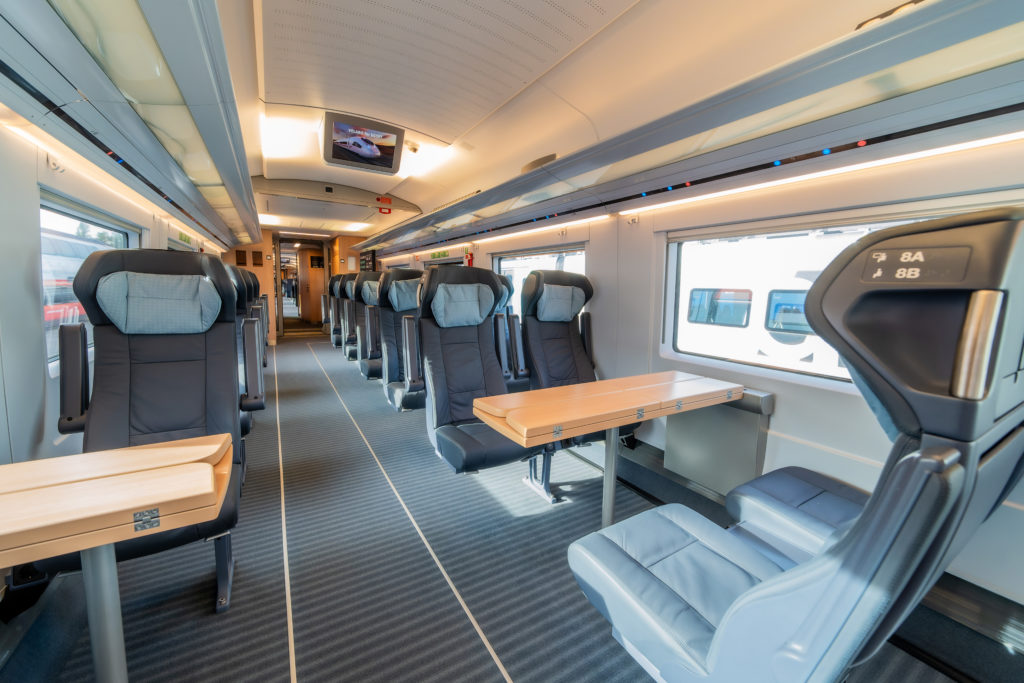Funding the next European rail boom and levelling the transport playing field with air and road travel
EU policymakers could revitalise European cities and regions through a sustainable transport boom, by reinvesting revenues from the EU Emissions Trading Scheme (ETS) and reforming the Energy Taxation Directive to include kerosene - as used in airline fuel - to ensure fair competition with rail.
UNIFE - the European Rail Supply Industry Association – today outlined a funding plan, which also calls for more private financing and sustainable financial instruments, which will enable the implementation of key recommendations made in Mario Draghi and Enrico Letta’s landmark reports on reforming the European Union.
In this plan, the incoming iteration of the EU Emissions Trading Scheme – in which some EU flights are still exempt – should focus on redirecting funds raised towards sustainable forms of transport such as intercity rail lines, metros and tram networks in order to accelerate the shift and help achieve carbon neutrality.
These forms of sustainable transport should be priortised by Member States and European Commission as part of the Social Climate Fund (SCF), and other associated revenues from the ETS scheme. Member States will submit their plans for this fund to the European Commission by June 2025.
With ETS and ETS2 revenues amounting to €65 billion, and together with a mandatory 25% contribution of the Member States to their Social Climate Plans, the SCF could mobilise at least €86.7 billion in investment over the 2026-2032 period.
Furthermore, reforming the Energy Taxation Directive revision is key to achieving a level playing field between modes of transport and would allow fair competition between airline and rail passenger services, in which kerosene based jet fuel currently has specific exemptions.
UNIFE would like to stress concern on the ongoing negotiations in the European Council, which could lead to a continuation of a tax exemption for fossil jet fuel until 2049 (i.e. a year before the EU is supposed to reach climate neutrality).
The absence of these costs in airline tickets, reflect some of the difference in pricing between airline and rail tickets. In some cases travel between European cities can be twice as expensive as flights. Changing this will drive a positive market signal to increase rail investment and services across Europe to meet growing demand, and while also severely cutting emissions from travellers.
Both Mario Draghi’s Competition Report and Enrico Letta’s More Than A Market Report significantly highlight the under development of the EU railway network and support greater investment.
Mario Draghi in the Transport Chapter of his report, strictly outlines “the price of [airline] journeys do not yet reflect their climate impacts”, while also outlining that Member States “should also reward projects that contribute to emission reduction by earmarking ETS revenues”. Letta’s report advocates for Sustainable Mobility Plans to be developed and implemented by Member States.
Both reports recommend finalising the ERTMS roll-out (European Rail Traffic Management System) and investing in DAC (Digital Automatic Coupling). Financing the two will significantly boost both passenger and freight rail services. This is alongside recommendations to invest in a high-speed rail network between European capitals, and key cities to create jobs, and further drive modernisation of the continent and EU economy.
Further to this, UNIFE supports ongoing dialogue in developing a Capital Markets Union to drive more private investment across Europe, while also supporting the use of green investment instruments, such as Green Bonds, through the European Investment Bank and other financial partners to fund rail projects.
Rail accounts for only 0.4% of Europe's transport greenhouse gas emissions, and is a proven, non-speculative and already available technology.
To read the full text of the European Rail Supply Industry’s Priorities for 2024-2029 click here.
Quotes attributable to UNIFE Director General Enno Wiebe
“By reinvesting funds from a Emissions Trading Scheme, we can make a greater transition to rail and other forms of sustainable transport. This will have a flow on effect and create jobs, while revitalising cities and regions across Europe.”
“Airlines have an advantage over railway operators by being exempt to a very reasonable charge on pollution, which is even paid by road operators. If this next EU mandate is about improving and levelling the competition framework, then reforming the Energy Taxation Directive should do that by including kerosene based fuels.”
“We need to work out ways to encourage greater private financing. This private finance would support any public EU or Member State contribution, and would go a long way to ensuring investment in the rail improvements Europeans are calling out for.”
For more information please contact:
Andrei Ciufu
UNIFE Head of Communications
andrei.ciufu@unife.org
+32 2 626 12 64
